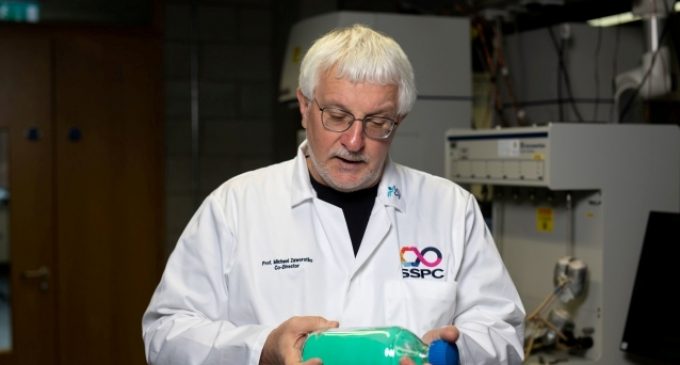Researchers to Grow Food Production With Zero Carbon Emissions

A University of Limerick-led research team in Ireland has designed a self-contained greenhouse that provides its own water and could have a major impact on global food production. The C-MINUS project brings together partners from industry and academia to address a new disruptive approach to farming – self-contained greenhouses that provide their own water and CO2 powered by sunlight.
“Not only could C-MINUS technology enable decentralised food production, it will do so with a negative carbon footprint,” according to Professor Michael Zaworotko (pictured), Bernal Chair of Crystal Engineering and Science Foundation of Ireland (SFI) Research Professor at UL’s Department of Chemical Sciences, who is leading the project. “Our goal is to grow food anywhere in the world, at any time, regardless of the environmental conditions – in a self-contained greenhouse, where there is no need for electricity, water, or sunlight,” he adds.
C-MINUS is a UL-NUIG project in partnership with Molecule RnD, an international think tank, research group and incubator fund that is located at UL.
The project has just successfully progressed to the Seed Phase of the SFI Future Innovator Prizes as part of the Zero Emissions Challenge announced recently by the Irish Government.
The project is a collaboration between Professor Zaworotko, Dr David Styles, lecturer in Environmental Engineering at UL and Stellenbosch University Research Chair in Nanostructured Functional Materials, Professor Len Barbour.
“This would be highly disruptive in a positive way were it to succeed and takes advantage of advanced porous materials that have been developed partly through the Molecule water project, and also partly through more basic research that was funded by the SFI,” explains Professor Zaworotko.
“The Future Innovate Prize is aimed at grand challenges, one of which is the programme that we are involved in, called the Zero Emissions Challenge. In our case, we took the Zero Emissions one step further, to negative emissions – hence the term C-MINUS, which in the context of carbon is where you want to be,” he adds.
The C-MINUS team aims to develop low energy carbon capture devices to enable on-site carbon capture and net negative carbon technologies.
It utilises a revolutionary new crystalline material developed by Professor Zaworotko at UL that has favourable properties for absorbing and releasing water from the atmosphere.
UL lecturer David Styles says he is “excited to be involved in C-MINUS, where we will be applying life cycle assessment to benchmark the environmental footprint of food grown in urban and arid locations using revolutionary technology to harvest carbon dioxide and water from air pioneered at UL.
“Ultimately, this technology could have far-reaching consequences for food security whilst sparing land to deliver biodiversity and net zero carbon targets,” he adds.
Bernal Institute Director, Professor Luuk van der Wielen, comments: “The coronavirus pandemic has underlined the importance of distributed, local manufacturing of food, reducing the dependence on global supply chains. The grant supports Professor Zaworotko’s research group and their partners Stellenbosch University and Molecule, with the fast development of this fully sustainable solution with impact for global food safety, firmly rooted in the structured materials research of the Bernal Institute of the University of Limerick.”
Professor Charles Spillane, Chair of Plant Science and Director of the Ryan Institute at NUIG, says: “I think we should see carbon negative as a horizon point – and if we can get to carbon neutral on that journey, then we are already succeeding. But it is a destination point that we should be trying to push greenhouse-based horticultural systems towards. If we can achieve that tipping point, from carbon neutral to carbon negative, then we will have done humanity a great service.”
The Irish Government has announced that twelve teams have been shortlisted to progress onto the next phase of the SFI Future Innovator Prize. Funded by the Department of Business, Enterprise and Innovation through SFI, this competition is part of an overall government plan to cultivate challenge-based funding in Ireland. The two challenges, the Artificial Intelligence (AI) for Societal Good Challenge and the Zero Emissions Challenge, are run in partnership with the Department of Foreign Affairs and Trade.


































